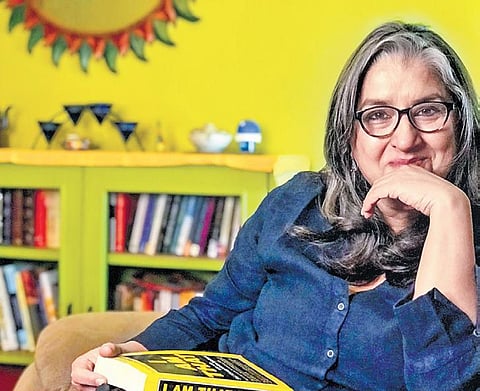

Smita Bharti is the recipient of Karmaveer Puraskaar 2016 for Social Change. She is the Executive Director of the rights-based NGO Sakshi, and also a Rotary World Peace Fellow, a Special Fellow WISCOMP and a Senior Fellow Literature, KK Birla Foundation. She has been with Sakshi since two decades as a theatre practitioner working with women who have survived third-degree domestic violence. Now she is directing the vision, charting the mission, crafting the action, building on the legacy that is Sakshi today.
Has social media impacted your reading habits?
I follow social media, but it is not a major part of my time, and it has not impacted my reading in any major way except that now my news is on apps, especially Scroll. Twitter gives me the trends, while Instagram and Facebook gives me insights into what the young and the old are thinking about and how they are engaging with and responding to current affairs.
What do you like to read?
Everything. I sometimes wonder at my interest to read books of all genres. And for that I would like to share a small story from my childhood. I was introduced to the world of independent reading at five when I received my first Enid Blyton as the Form Prize. Close on its heels, my uncle brought home about a 100 books of original three act comedy plays performed at the Gaiety Theatre in Shimla by the Britishers from the early 1900s.
Lastly, I inherited a library of books left behind by six uncles, and as many aunts, which ranged from Hindu Mythology to Cowboy series to Harold Robbins, to Arthur Hailey, not to miss the entire universe of Enid Blyton, fairy tales to school series to the sleuth she brewed in every young reader. By the time I was 15, J Krishnamurti jostled on the shelves with Premchand, Paulo Freire with Krishnachander.
As I grew, Naomi Klein came to live with Ismat Chughtai, Manto with Neruda, Wordsworth ended up with Maitreyi Pushpa, Catharine MacKinnon, Bell Hooks, Uma Chakravarty, Ratna Kapur, Amrita Pritam, Krishna Sobti and Gloria Stienham amongst many other combinations. A voracious reader and a loner, books have been my lifelong companions and fuelled my imagination. They have given me comfort, held my aching heart, provided frameworks to interpret relationships, examine experiences, and interrogate structures we take for granted.
What kind of reading puts you off?
Writing characterised by a paucity of expression, a plot that folds on itself, a story that goes nowhere, ideas that don’t stimulate, and a deprived imagination are some of the things that make me lose interest very soon.
What about the written word is it that video/audio mediums cannot fulfill?
It is said that the written word gives us space to imagine our world. But more important for me is that reading as opposed to a video/audio medium gives me the space to set my own pace to how much and what I want to absorb, assimilate, and recall. It is possible for me to revisit my favourite passages, and revel in the cadence of my own voice, as I read aloud sometimes.
Do you maintain a book-shelf or an e-library?
Oh yes, I have always lived with cabinets filled with books. Even today, we have a book cabinet in almost each room in the house. The office too has always had a huge library of books. And now there’s Kindle. What can be better than that if you are constantly moving around and feel incomplete without these companions?
But at home, nothing can replace the feel and smell of a new book, or the dog-eared pages of an old book that has notes, scribbles from down the ages as it gets passed on from one avid reader to the next.